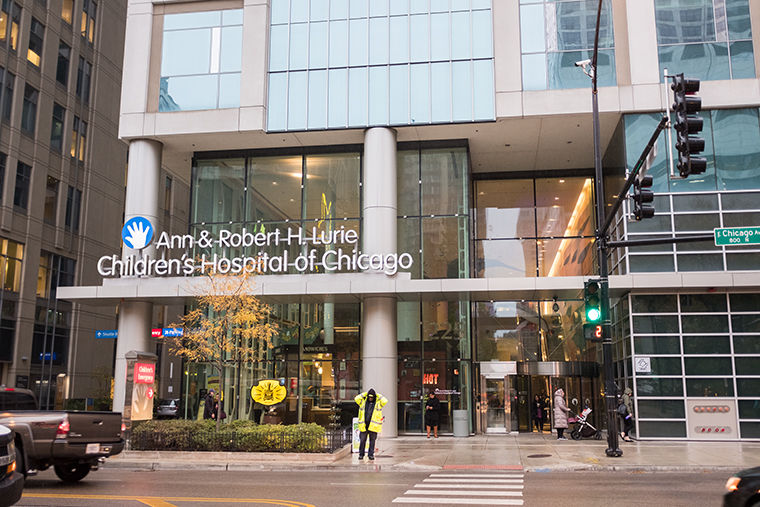Intersex advocates fight hospitals for change
Ann & Robert H. Lurie Children’s Hospital of Chicago, 225 E. Chicago Ave., was greeted by protesters Oct. 26. Despite pressure from them, the hospital has not renounced surgeries on intersex children.
November 6, 2017
Debate over controversial surgeries performed on intersex babies grows as advocates protest a local hospital that allows sex assignment operations.
Intersex individuals—1.7 percent of all newborns in the U.S.—are born with sex characteristics that do not correspond to the binary definitions of male or female bodies, according to the U.N. Free & Equal definition—a campaign to promote LGBTQ rights. These children could be subjected—with permission from their parents—to surgeries from a young age until their early teen years in an attempt to get them to conform to a binary gender and could face a lifetime of hormone treatments and additional cosmetic surgeries.
Protesters stood outside Ann & Robert H. Lurie Children’s Hospital of Chicago, 225 E. Chicago Ave., Oct. 26 demanding the hospital change its protocol for treating intersex children, which includes the option of hormone therapy and cosmetic surgeries, according to its website.
“There were many interviews done during which intersex people detailed the pain and anguish they’ve been through due to these surgeries,” said Sylvan Fraser, staff attorney for interACT Advocates for Intersex Youth—an intersex advocacy group in Sudbury, Massachusetts. Surgeries on intersex patients, like those the group has drawn attention to over the last few years, have caused complications such as sexual dysfunction, chronic pain, urinary incontinence and post-traumatic stress disorder, they added.
It is unknown how many hospitals in the country continue to perform these surgeries, according to local experts.
Pidgeon Pagonis, 31, an intersex activist from Pilsen, went to LCH as early as 9 months old and had three surgeries at ages 1, 4 and 11 to assign them a binary gender. They will also be taking hormone pills for the rest of their life because of the surgeries they had as a child.
“You have a lot of psychological damage, [and] you have a lot of emotional damage,” Pagonis said.
Despite LCH’s continued use of surgery on intersex people, most surgeries are not performered for emergency purposes, according to the hospital’s website.
According to an Oct. 26 emailed statement sent to the Chronicle Oct. 30 from LCH, the hospital “is dedicated to the development of optimal multidisciplinary care for intersex individuals and their families [and] committed to open communication with the intersex community and fully respect[s] the diversity of opinions that exist in affected individuals.”
Despite push for change, some professionals in the field won’t take action, said Georgiann Davis, assistant professor of sociology at University of Nevada, Las Vegas.
“Doctors don’t want to admit they could be wrong and that they’ve been wrong in what they’ve been doing,” Davis said. “Putting an end to [the surgeries] would acknowledge that.”
Multiple medical professionals and associations have come out to condemn the procedures, including the American Medical Association and three former U.S. surgeon generals. The U.N. special rapporteur called intersex surgeries on children “rarely medically necessary” in February 2013, according to the U.N.
“They know what they’re doing, and they know the Human Rights Watch [and the] U.N. have come out against these [surgeries],” Pagonis said. “They know all of that, and they still continue to do the surgeries.”
Despite the pushback from advocacy groups, LCH has not altered its Differences of Sex Development program or its methods for treatment of intersex children, Davis said, noting many providers unfortunately will not listen to the arguments or stop performing these interventions.
Both Davis and Fraser said surgeries like these are commonplace nationwide, and few hospitals—if any—have come out to condemn the practice.
“Given that there is so much support for the common sense notion of delaying these surgeries [until the patient can make their own decision], I’m not sure I could answer why they continue to be done,” Fraser said.








